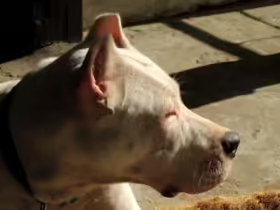Cognitive Dysfunction in Senior Dogs: Managing Your Dog’s Mental Decline
As our beloved canine companions age, they experience physical and mental changes, much like humans. One common issue seen in senior dogs is Cognitive Dysfunction Syndrome (CDS), often compared to Alzheimer’s disease in humans. This progressive condition affects a dog’s memory, awareness, learning abilities, and behavior, leading to a decline in mental function over time.
In this article, we’ll discuss the signs of cognitive dysfunction in senior dogs, its causes, and how you can manage your dog’s mental decline to improve their quality of life during their golden years.
What is Cognitive Dysfunction Syndrome (CDS) in Dogs?
Cognitive Dysfunction Syndrome (CDS) is a neurodegenerative disorder that affects aging dogs, similar to dementia or Alzheimer’s disease in humans. CDS is characterized by a gradual decline in cognitive abilities, impacting the dog’s memory, learning, spatial awareness, and problem-solving skills. While this condition primarily affects older dogs, it can sometimes appear in middle-aged dogs as well.
CDS is caused by physical changes in the brain, including the buildup of amyloid plaques, oxidative stress, and neurodegeneration. These changes interfere with the normal functioning of the brain and cause the symptoms commonly associated with the syndrome.
Key Symptoms of CDS:
- Disorientation: Confusion about surroundings, getting lost in familiar places.
- Altered Sleep-Wake Cycles: Restlessness at night, increased daytime sleeping.
- Decreased Interaction: Less engagement with family members or other pets.
- House-Soiling: Forgetting house training, having accidents indoors.
- Increased Anxiety: New fears, restlessness, or clinginess.
- Behavioral Changes: Irritability, withdrawal, or unusual behaviors.
These symptoms may start out subtle but tend to worsen over time. Early detection and management are crucial for helping your dog live comfortably.
Understanding the Aging Brain in Dogs
As dogs age, they go through a variety of physiological changes that can affect their brain function. These changes include:
- Amyloid Plaques: As mentioned earlier, the accumulation of beta-amyloid plaques in the brain disrupts nerve signals and causes cognitive decline.
- Oxidative Damage: Aging causes oxidative damage to brain cells, which impairs the brain’s ability to function properly.
- Neurotransmitter Decline: The levels of neurotransmitters like dopamine and serotonin decrease with age, leading to changes in behavior, mood, and cognitive function.
- Vascular Changes: Reduced blood flow to the brain can further impair cognitive function.
These age-related changes contribute to the symptoms of cognitive dysfunction in dogs and make it more challenging for them to navigate their environment.
Recognizing Cognitive Dysfunction in Your Dog
Early detection of CDS is key to managing the condition effectively. The signs of cognitive dysfunction often appear gradually, and they may be mistaken for other health issues or simply a normal part of aging. However, certain behaviors are more indicative of cognitive decline than others.
Common Signs of Cognitive Dysfunction:
- Disorientation and Confusion Your dog may get lost in familiar places, such as your home or yard. They might stand at the wrong side of the door, stare blankly at walls, or appear confused when navigating spaces they once knew well.
- Changes in Sleep Patterns Dogs with cognitive dysfunction often experience changes in their sleep-wake cycle. They may be restless at night, pacing or whining, and sleep more during the day. These disturbances can lead to sleep deprivation, which exacerbates cognitive decline.
- Decreased Social Interaction If your dog suddenly seems less interested in interacting with family members or other pets, it could be a sign of cognitive decline. Dogs with CDS may become withdrawn, less playful, or more irritable.
- Loss of House-Training House-soiling is a common sign of cognitive dysfunction. Your dog may forget their house-training routine and have accidents indoors, even if they’ve been well-trained for years.
- Changes in Activity Level You may notice that your dog is less active and more lethargic than usual. On the other hand, some dogs may become more anxious and restless, displaying repetitive behaviors such as pacing or circling.
- New or Increased Anxiety Cognitive dysfunction can lead to increased anxiety, particularly separation anxiety. Dogs may become more clingy, vocalize excessively, or display other signs of distress when left alone.
- Behavioral Changes Your dog’s behavior may change in unexpected ways. They may become more aggressive, irritable, or withdrawn. In some cases, they may develop new fears or phobias.
Managing Cognitive Dysfunction in Senior Dogs
While there is no cure for cognitive dysfunction, there are several strategies that can help slow its progression and manage its symptoms. These include dietary changes, medications, supplements, mental stimulation, and environmental modifications.
1. Dietary Changes for Brain Health
Nutrition plays a vital role in maintaining brain health, especially in senior dogs. Some specialized diets are designed to support cognitive function by providing essential nutrients that promote brain health.
Key Nutrients for Cognitive Health:
- Antioxidants: Help combat oxidative stress and reduce brain cell damage.
- Omega-3 Fatty Acids: Found in fish oil, these support healthy brain function.
- Vitamins E and C: Powerful antioxidants that support brain health.
- B Vitamins: Essential for proper nerve function and energy metabolism.
There are commercial diets specifically formulated for senior dogs with cognitive decline, such as those rich in antioxidants and omega-3 fatty acids. Talk to your vet about whether a dietary change could benefit your dog.
2. Medications for Cognitive Dysfunction
Several medications are available to help manage cognitive dysfunction in dogs. These medications aim to improve cognitive function and reduce symptoms like anxiety and confusion.
- Selegiline (Anipryl): A medication commonly prescribed to slow the progression of cognitive dysfunction. It works by increasing dopamine levels in the brain, which can improve cognitive function and behavior.
- Anxiety Medications: If anxiety is a significant symptom, your vet may prescribe anti-anxiety medications to help manage your dog’s stress levels.
3. Supplements to Support Brain Function
In addition to medication, certain supplements can help support cognitive function in senior dogs. These supplements include:
- SAMe (S-Adenosylmethionine): A supplement that supports liver function and has antioxidant properties that benefit the brain.
- Phosphatidylserine: A phospholipid that supports brain cell communication and may help improve memory.
- Ginkgo Biloba: An herb known for its cognitive-enhancing properties.
Consult your veterinarian before adding any supplements to your dog’s diet, as they can recommend the appropriate dosage and combination based on your dog’s specific needs.
4. Mental Stimulation and Enrichment
Keeping your dog mentally engaged is crucial in slowing cognitive decline. Just as with humans, mental exercises can help keep the brain sharp and improve overall cognitive function.
Ways to Mentally Stimulate Your Dog:
- Puzzle Toys: Interactive toys that challenge your dog to solve problems can stimulate their brain and keep them engaged.
- Scent Work: Encourage your dog to use their sense of smell by hiding treats or toys for them to find.
- Training: Even in their senior years, dogs can benefit from learning new tricks or commands, which keeps their brain active.
Regular, low-stress mental stimulation is important for dogs with cognitive dysfunction, as it helps maintain cognitive function and can reduce the severity of symptoms.
5. Environmental Modifications
Making changes to your dog’s environment can help them feel more comfortable and secure as they navigate cognitive dysfunction.
- Consistent Routine: Dogs with cognitive dysfunction thrive on routine. Keeping feeding, walking, and sleeping times consistent can reduce confusion and anxiety.
- Simplifying Their Space: Minimize obstacles and keep your dog’s environment as simple and predictable as possible. Ensure that their food, water, and bed are easy to access.
- Nightlights: If your dog is experiencing disorientation or anxiety at night, using nightlights can help them navigate their surroundings more easily.
6. Exercise and Physical Activity
Regular, moderate exercise is beneficial for both the body and the mind. Physical activity helps maintain mobility, reduces anxiety, and can improve mood. Aim for gentle, low-impact activities such as short walks or swimming, depending on your dog’s physical capabilities.
Helping Your Dog Live Comfortably with Cognitive Dysfunction
Caring for a dog with cognitive dysfunction can be challenging, but with the right strategies in place, you can help your senior dog live a more comfortable and fulfilling life. Here are some additional tips for supporting your dog’s mental health and well-being:
- Patience and Compassion Senior dogs with cognitive dysfunction may experience confusion, anxiety, or frustration. Patience is key as you navigate these changes with your dog. Offering comfort, reassurance, and understanding can go a long way in helping them feel secure.
- Regular Veterinary Checkups Regular checkups are essential for monitoring the progression of cognitive dysfunction and ensuring your dog’s overall health. Your vet can adjust medications, recommend new











Leave a Reply